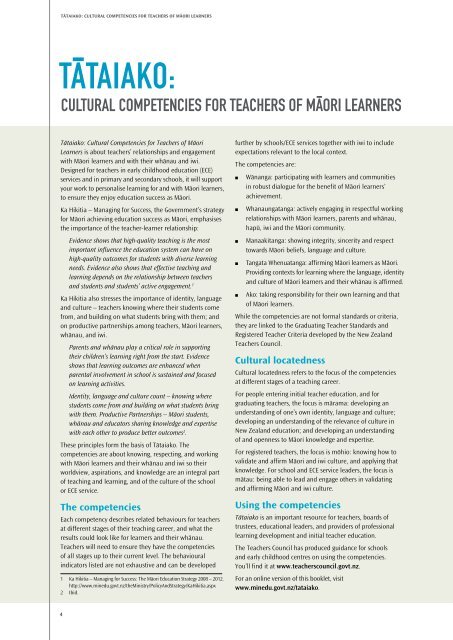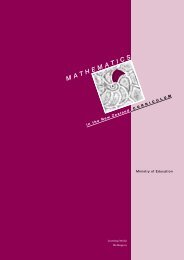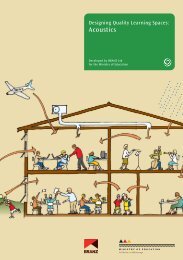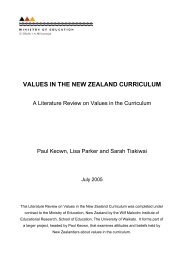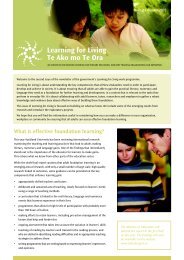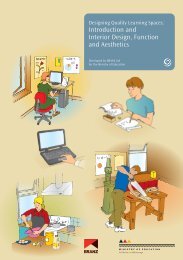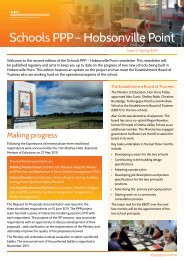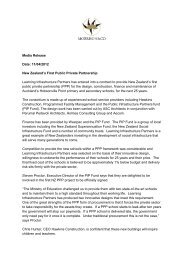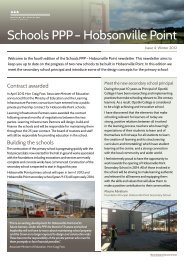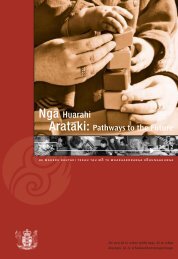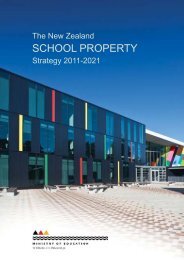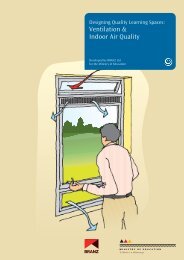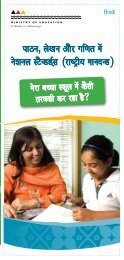Cultural Competencies for Teachers of Māori Learners - Ministry of ...
Cultural Competencies for Teachers of Māori Learners - Ministry of ...
Cultural Competencies for Teachers of Māori Learners - Ministry of ...
Create successful ePaper yourself
Turn your PDF publications into a flip-book with our unique Google optimized e-Paper software.
TÄTAIAKO: CULTURAL COMPETENCIES FOR TEACHERS OF MÄORI LEARNERS<br />
TATAIAKO: -<br />
CULTURAL COMPETENCIES FOR TEACHERS OF MAORI LEARNERS<br />
Tätaiako: <strong>Cultural</strong> <strong>Competencies</strong> <strong>for</strong> <strong>Teachers</strong> <strong>of</strong> Mäori<br />
<strong>Learners</strong> is about teachers’ relationships and engagement<br />
with Mäori learners and with their whänau and iwi.<br />
Designed <strong>for</strong> teachers in early childhood education (ECE)<br />
services and in primary and secondary schools, it will support<br />
your work to personalise learning <strong>for</strong> and with Mäori learners,<br />
to ensure they enjoy education success as Mäori.<br />
Ka Hikitia – Managing <strong>for</strong> Success, the Government’s strategy<br />
<strong>for</strong> Mäori achieving education success as Mäori, emphasises<br />
the importance <strong>of</strong> the teacher-learner relationship:<br />
4<br />
-<br />
Evidence shows that high-quality teaching is the most<br />
important influence the education system can have on<br />
high-quality outcomes <strong>for</strong> students with diverse learning<br />
needs. Evidence also shows that effective teaching and<br />
learning depends on the relationship between teachers<br />
and students and students’ active engagement. 1<br />
Ka Hikitia also stresses the importance <strong>of</strong> identity, language<br />
and culture – teachers knowing where their students come<br />
from, and building on what students bring with them; and<br />
on productive partnerships among teachers, Mäori learners,<br />
whänau, and iwi.<br />
Parents and whänau play a critical role in supporting<br />
their children’s learning right from the start. Evidence<br />
shows that learning outcomes are enhanced when<br />
parental involvement in school is sustained and focused<br />
on learning activities.<br />
Identity, language and culture count – knowing where<br />
students come from and building on what students bring<br />
with them. Productive Partnerships – Mäori students,<br />
whänau and educators sharing knowledge and expertise<br />
with each other to produce better outcomes2 .<br />
These principles <strong>for</strong>m the basis <strong>of</strong> Tätaiako. The<br />
competencies are about knowing, respecting, and working<br />
with Mäori learners and their whänau and iwi so their<br />
worldview, aspirations, and knowledge are an integral part<br />
<strong>of</strong> teaching and learning, and <strong>of</strong> the culture <strong>of</strong> the school<br />
or ECE service.<br />
The competencies<br />
Each competency describes related behaviours <strong>for</strong> teachers<br />
at different stages <strong>of</strong> their teaching career, and what the<br />
results could look like <strong>for</strong> learners and their whänau.<br />
<strong>Teachers</strong> will need to ensure they have the competencies<br />
<strong>of</strong> all stages up to their current level. The behavioural<br />
indicators listed are not exhaustive and can be developed<br />
1 Ka Hikitia – Managing <strong>for</strong> Success: The Mäori Education Strategy 2008 – 2012.<br />
http://www.minedu.govt.nz/the<strong>Ministry</strong>/PolicyAndStrategy/KaHikitia.aspx<br />
2 Ibid.<br />
further by schools/ECE services together with iwi to include<br />
expectations relevant to the local context.<br />
The competencies are:<br />
■ Wänanga: participating with learners and communities<br />
in robust dialogue <strong>for</strong> the benefit <strong>of</strong> Mäori learners’<br />
achievement.<br />
■ Whanaungatanga: actively engaging in respectful working<br />
relationships with Mäori learners, parents and whänau,<br />
hapü, iwi and the Mäori community.<br />
■ Manaakitanga: showing integrity, sincerity and respect<br />
towards Mäori beliefs, language and culture.<br />
■ Tangata Whenuatanga: affirming Mäori learners as Mäori.<br />
Providing contexts <strong>for</strong> learning where the language, identity<br />
and culture <strong>of</strong> Mäori learners and their whänau is affirmed.<br />
■ Ako: taking responsibility <strong>for</strong> their own learning and that<br />
<strong>of</strong> Mäori learners.<br />
While the competencies are not <strong>for</strong>mal standards or criteria,<br />
they are linked to the Graduating Teacher Standards and<br />
Registered Teacher Criteria developed by the New Zealand<br />
<strong>Teachers</strong> Council.<br />
<strong>Cultural</strong> locatedness<br />
<strong>Cultural</strong> locatedness refers to the focus <strong>of</strong> the competencies<br />
at different stages <strong>of</strong> a teaching career.<br />
For people entering initial teacher education, and <strong>for</strong><br />
graduating teachers, the focus is märama: developing an<br />
understanding <strong>of</strong> one’s own identity, language and culture;<br />
developing an understanding <strong>of</strong> the relevance <strong>of</strong> culture in<br />
New Zealand education; and developing an understanding<br />
<strong>of</strong> and openness to Mäori knowledge and expertise.<br />
For registered teachers, the focus is möhio: knowing how to<br />
validate and affirm Mäori and iwi culture, and applying that<br />
knowledge. For school and ECE service leaders, the focus is<br />
mätau: being able to lead and engage others in validating<br />
and affirming Mäori and iwi culture.<br />
Using the competencies<br />
Tätaiako is an important resource <strong>for</strong> teachers, boards <strong>of</strong><br />
trustees, educational leaders, and providers <strong>of</strong> pr<strong>of</strong>essional<br />
learning development and initial teacher education.<br />
The <strong>Teachers</strong> Council has produced guidance <strong>for</strong> schools<br />
and early childhood centres on using the competencies.<br />
You’ll find it at www.teacherscouncil.govt.nz.<br />
For an online version <strong>of</strong> this booklet, visit<br />
www.minedu.govt.nz/tataiako.


